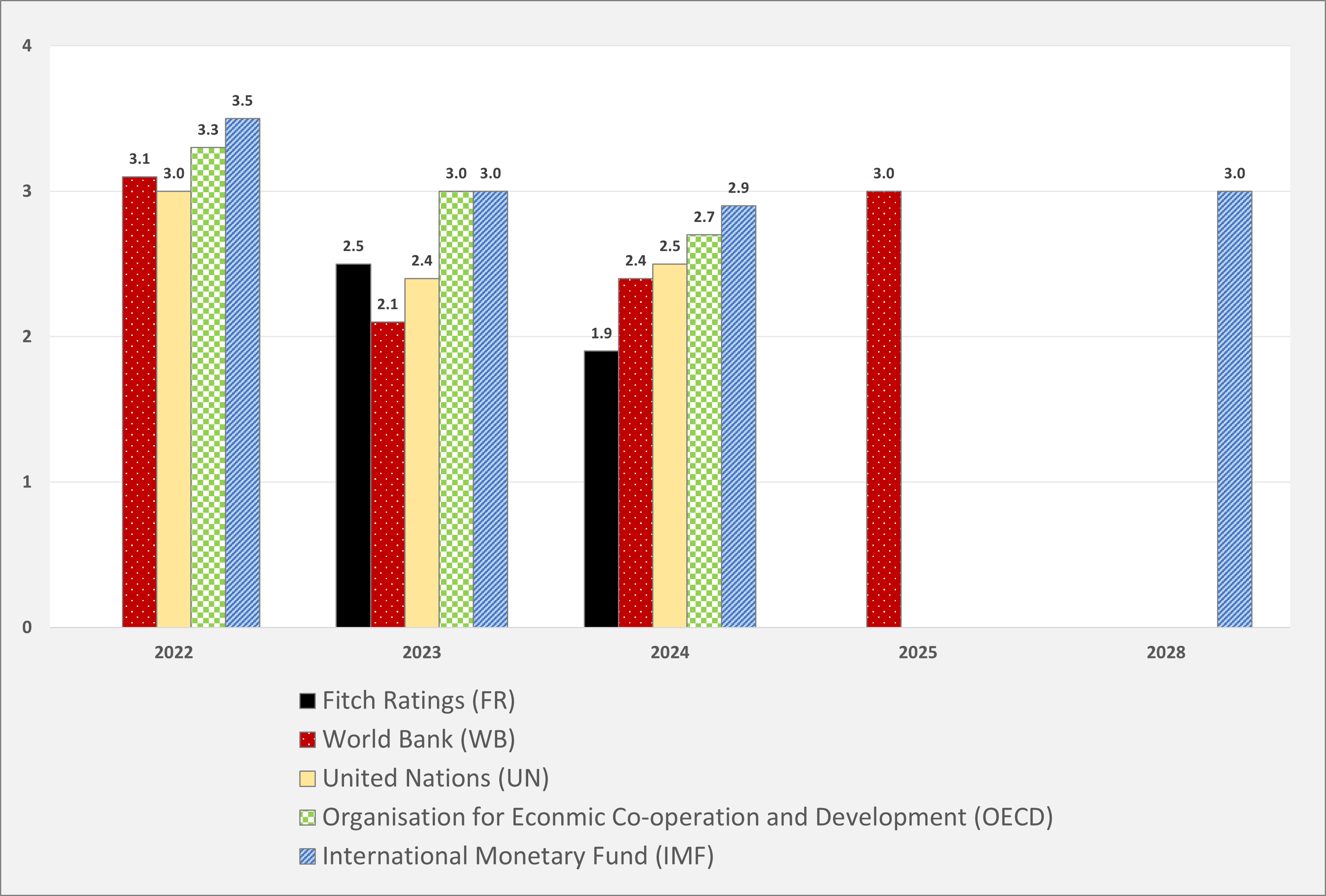Economic outlook 2023 and beyond: lengthy period of subdued growth
16 October 2023
As the end of 2023 approaches, many organizations, among which, the International Monetary Fund (IMF), the Organisation for Economic Co-operation and Development (OECD), the United Nations (UN), and Fitch Ratings (FR) are publishing their updated economic growth projections for this year and beyond. (See Figure 1 for an overview of selected growth rates issued for the period 2022-2028.)[1]
As Figure 1 reveals, the global economy is estimated to have grown between 3.0% – 3.5% in 2022. The projections for 2023 indicate a growth deceleration compared to 2022, but less pronounced than originally anticipated (See article: 2023: Year of continued wariness).
The lowest growth forecast made for 2023 is also the oldest: 2.1%, as it was issued by the World Bank in June this year. The projections by FR: 2.5%, and the OECD: 3.0%, contain more recent information, as they were published in September 2023. The UN forecast: 2.4%, and that of the IMF: 3.0%, are the most recent, as they were published during the first half of October 2023.
The resilience shown by the global economic output so far in 2023 is remarkable, especially considering the ongoing fight against inflation, the disruptive effects of the war in Ukraine on commodity markets, and the slowdown of the Chinese economy as a result of its property market woes. Moreover, many economies are still struggling to reattain pre-pandemic income and employment levels, while coping with decimated fiscal buffers, crippling debt burdens, and sharp rises in refinancing costs.
Figure 1 Selected economic growth rates 2022-2028

The projections made for 2024 and beyond (WB: 2025, and IMF: 2028) indicate that the world’s economic growth is expected to remain rather subdued for the time being (around 3.0% on average). Persisting inflation is expected to significantly weigh down global demand the coming few years. Although price levels have been decelerating in general during 2023, core inflation is expected to continue to decline very gradually. Therefore, inflation is not expected to return to target until sometime after 2024.
The low growth rates anticipated for the coming years are also attributable to several other factors, among which: deepening inequalities between and within countries, rising climate change-induced losses, and increased disruptions that may arise due to escalating geopolitical conflicts (including the war in Ukraine, and the war between Israel and Hamas militants).
According to data released by the IMF, the historical average of global economic growth in the 2000-2019 period was 3.8%. Even if a yearly growth rate of 3% is reached in the 2024-2028 period, this is not likely to suffice to ensure the attainability of many urgent policies and measures that need to be implemented globally in the short-and medium term, in particular the sustainable development goals and the emission-reduction targets to combat climate change.
In its latest trade report, the UN indicates that failure of global growth to rebound sufficiently to pre-pandemic trends means that pressing matters like food security, social protection, and climate adaptation are at risk of not being addressed. Given the many uphill challenges faced by developing, emerging, and advanced economies alike, policymakers around the world are urged to steadily implement the policies and measures that are needed to prevent potential crises, and assure that economic growth is embarked on a sustainable, inclusive, and equitable path.
[1] Most organizations do not make global growth projections for more than 1 year beyond the current year (in this case: 2024). The World Bank also issues a growth projection for 2 years ahead, while the IMF includes a Five-Year-Ahead projection in its outlook.
Sources:
- Fitch Ratings — Global Economic Outlook – September 2023.
- Fitch Ratings — World Growth Outlook for 2024 Deteriorates as China Risks Rise – September 2023.
- International Monetary Fund — World Economic Outlook – July 2023, October 2023.
- Organisation for Economic Co-operation and Development – OECD Economic Outlook – Interim Report September 2023.
- United Nations — UNCTAD Trade and Development Report 2023 – Growth, Debt, and Climate: Realigning the Global Financial Architecture – PART I – October 2023.
- World Bank — Global Economic Prospects – June 2023.
- Reuters — Key takeaways from IMF/World Bank meetings in Morocco – October 16, 2023.
